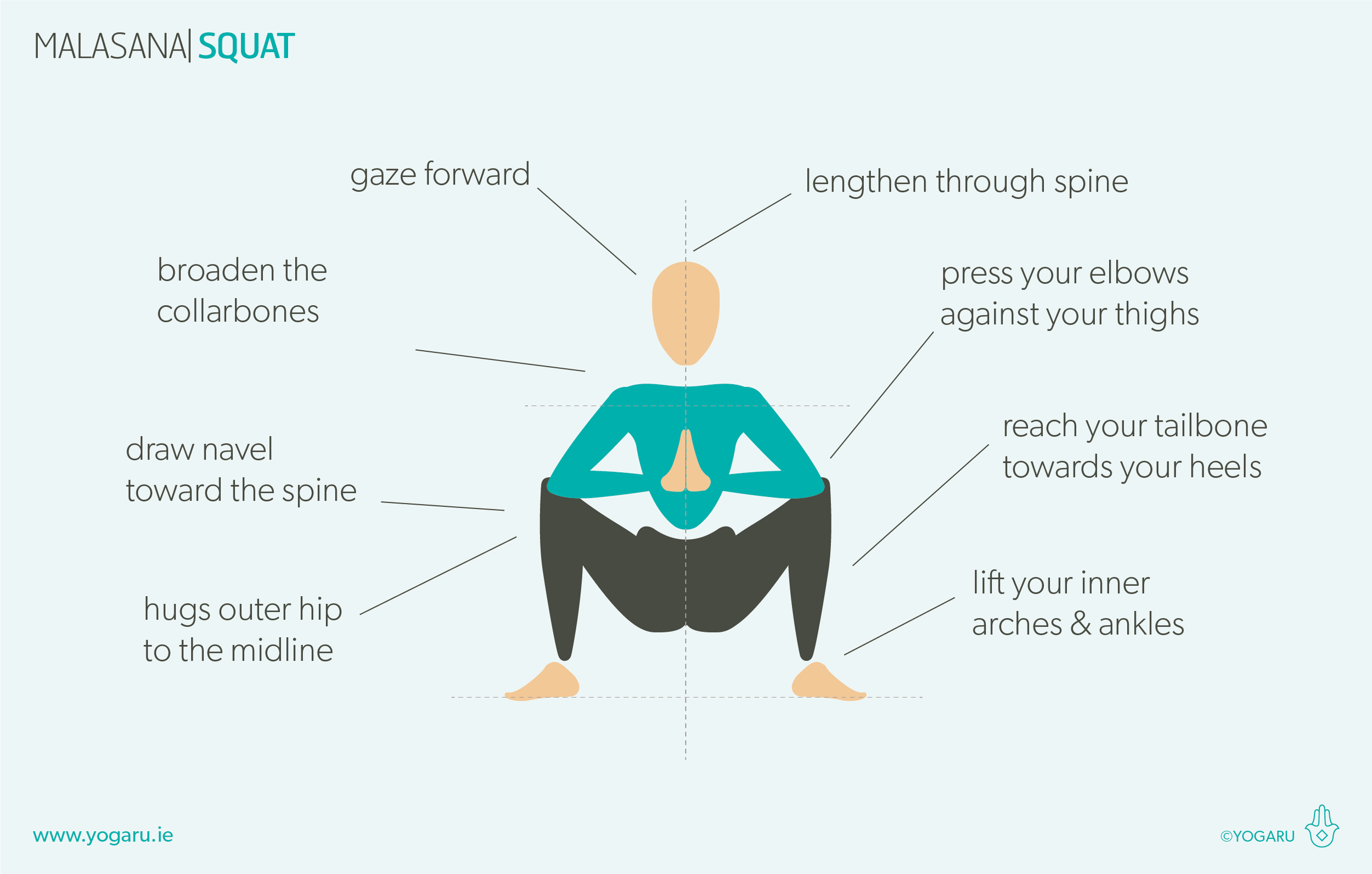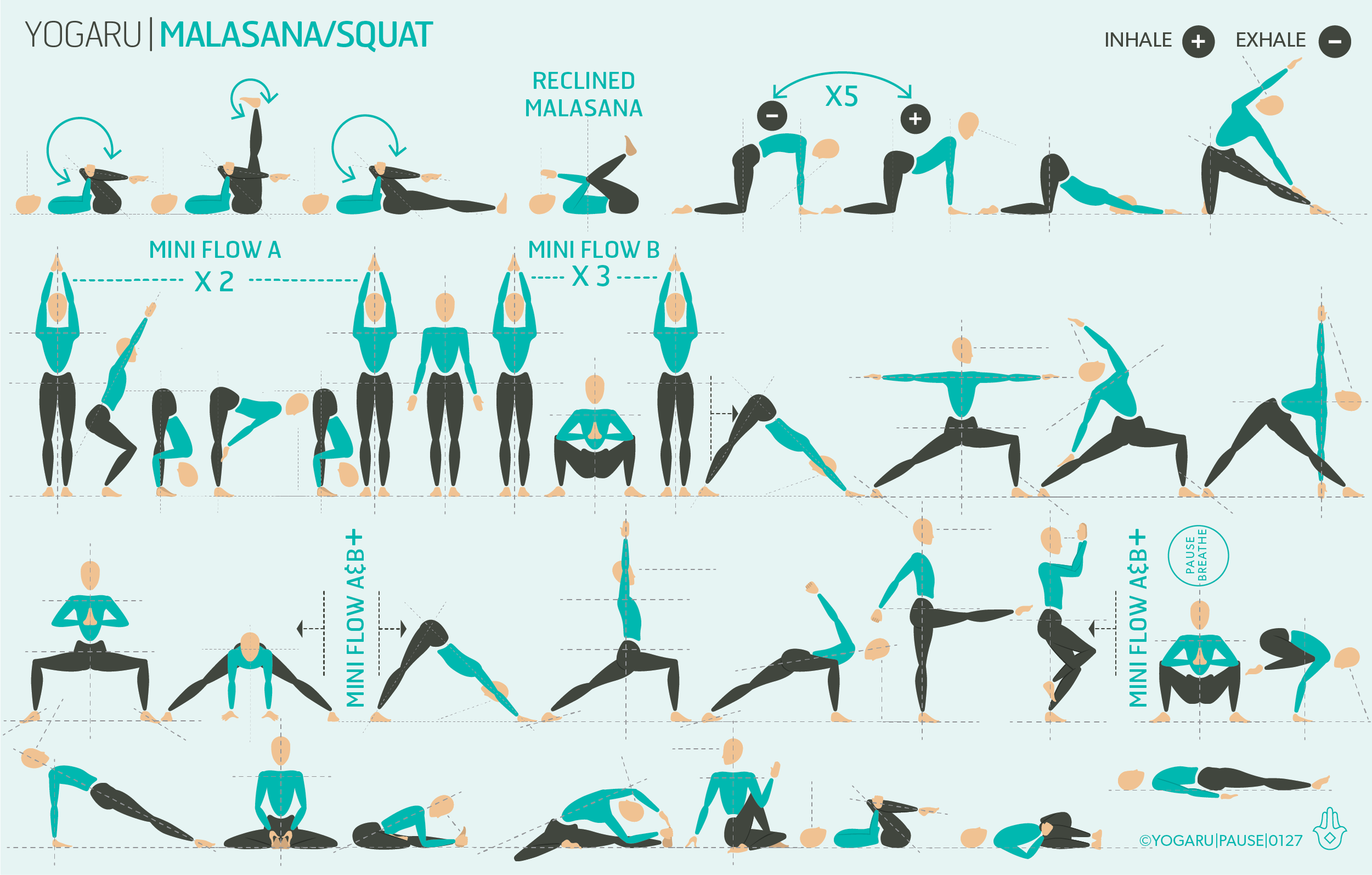HIP MOBILITY & STABILITY
Recently I’ve been sitting writing articles more than I usually would and my hips are feeling it. This spurred me on to explore Malasana/Squat as my pose of the month. When I first practiced this sequence I found the repeated rounds of Malasana/Squat tough going but as the week progressed my hips started to feel stronger, more flexible and I was able to hold Malasana/Squat for a longer period of time. I have been practising this sequence for the last two weeks now and my hips are singing with glee. Malasana/Squat has so many hidden physical and mentally benefits and I’m definitely feeling them all.
Malasana/Squat was once the way we all sat before we invented the humble chair and is still the sitting method for many cultures. It is very strengthening on the leg, core and pelvic floor muscles. The ability to squat is important to maintain for everyday mobility. We squat down in our day to day life when we pick something up from the ground or tie our shoes. My son is a keen rugby player and squats for five minutes everyday as a way to keep his hips, knees and ankles strong and injury free. You don’t have to be on your mat to take a squat. Malasana/Squat teaches the body to find the natural curves of the spine again and is perfect to add into your movement breaks if you are sitting for long period and working from home.
THE BENEFITS OF MALASANA/SQUAT
Malasana/Squat stretches the inner groin and hips, strengthens the hip flexors, lower back, knees and ankles. It is a very good pose for keeping the knees and ankles flexible and strong at the same time. It encourages strengthening of the pelvic floor, increases circulation to the abdominal organs, aids digestion and eases constipation. As with backbends and twists it stimulates a healthy gut which has a strong link to our moods and emotional well-being. Stress leads to gut issues and similarly gut issues lead to stress. 95% of serotonin (the happy hormone) is produced in the bowel, stimulating the gut and releasing these happy hormones into the system relieves stress, tension and anxiety.
EXPLORING MALASANA/SQUAT IN YOUR PRACTICE
This sequence will gradually prepare your hips for Malasana/Squat. Malasana/Squat mini flow is preceded by a Utkatasana/Chair mini flow. Utkatasana/Chair is a perfect prep pose for Malasana/Squat. It strengthens the glutes and has many of the same muscular actions as Malasana/Squat – hip and knee flexion, spinal extension and grounding down through the three points of the feet. For the first three Malasana/Squat mini flows move in and out of the pose with a steady and lengthened breath. Look for the point in your descent where you want to speed up and try to consciously slow it down. For your final Malasana/Squat before you come to your seated poses, pause for three to five deep breaths and feel the full opening of the pose.
You can also check out my Instagram post on Malasana/Squat to play around with different versions of the pose. If you notice your knees collapse in it is an indication that you might have tight inner groins and weak glutes – squeeze your outer glutes to externally rotate your hips and only go down as far as you can keep your knees in line with your feet. If you notice your lower back rounds forward you might have a weak lower back – place bricks under your hands and press into them to lengthen up through the spine.
ALIGNMENT CUES
You will come through three rounds of Malasana/Squat and a final one before you come down to your seated poses. Notice how the first round feels compared to your final round in terms of comfort and depth of the pose. If you practice this pose for a week or two you will start to notice great improvements in your hip mobility.
Have a read of the tips below and either print out the sequence or save it onto your device:
From Tadasana/Mountain, inhale, feet wider than hip width, feet slightly turned out, hands in prayer position, exhale, bend your knees and sit down in a deep squat.
Press your elbows against your thighs, hug your outer hips to the midline, let your pelvis become heavy down towards the back of your heels. Lift your inner arches and inner ankles.
Broaden through the collarbones, draw your navel towards your spine, lift your pelvic floor. Lengthen through your spine to the tip of your crown, gaze forward.
Subscribe to my newsletter & get a FREE YOGA BENEFITS INFOGRAPHIC as a thank you!
To save the images for personal use click and hold down the image until the ‘save image’ option appears; on Mac hold down ‘control’ and click the image to get the option box; on PC right click on the image to get the option box. Scroll down in the ‘option box’ and click ‘save image’.
Ruth Delahunty Yogaru


